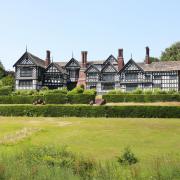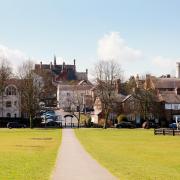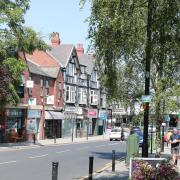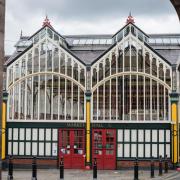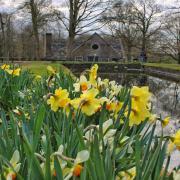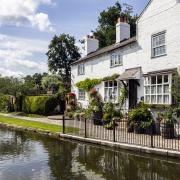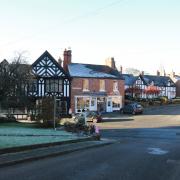How to help Cheshire’s historic houses stay in business after coronavirus

Five ways to support our historic homes
1. Don’t cancel your membership if you have one
2. Be supportive by posting on social media
3. Investigate ways you can make a donation. For example, the Tatton Park Charitable Trust exists to raise funds for conservation and education

4. When lockdown is lifted, become a volunteer
5. Take someone along with you when you can visit
A ban on visitors and events during the coronavirus lockdown has had a huge impact on Cheshire’s country houses. Even when restrictions are lifted and the mansions open their gates to the public, they will still face a struggle, with a fortune lost from ticket sales and key events.

And having our heritage on hold is a big headache for those running properties, some of which require millions of pounds to keep them viable. Sarah Callander Beckett, chair of the North West Region of Historic Houses, and owner of Combermere Abbey in Whitchurch, says: “Cheshire has some of the best gardens in the country and the effect of lockdown is to deny both public access to the gardens and events. So, there’s a major economic impact on the part of the properties.”
While the financial impact is significant, there’s also the role these estates and houses play in the life of the nation. “Our cultural heritage has become one of the casualties of the coronavirus.
“Historic houses that are open to the public, of which there are a very substantial number in Cheshire, give a lovely balanced historical overview of the region but at the moment that’s just not possible.”
It’s the unique status of the historic house Sarah believes should be considered once restrictions are lifted and she is calling for them to be treated as a special case. “We do not want to be part of a blanket range of restrictions. For example, it should be made possible for properties to open up to people who want to walk their dogs and maybe offer refreshments in a different way, maybe by using a mobile van, rather than in a restaurant. It’s about being able to engage the public in any way we can.

“As long as social distancing is observed it would mean we can bring people back to work so livelihoods can be regenerated.”
Lockdown has seen the cancellation of dozens of weddings at numerous venues, which has had an emotional as well as monetary effect.
At Combermere Abbey, a former monastery dating back to the 12th century, 25 ceremonies have been postponed but Sarah admits the number could increase depending on restrictions in place, causing heartache for brides and grooms, as well as those in the business whose livelihoods have been lost.
“A lot of wedding venues have felt the impact, not only on the venue it’s also all the businesses that rely on them too,” she explains. “The trickledown effect has been enormous. It’s a lose-lose for everybody.”

With a skeleton staff of around four or five out of 25 and with the rest on furlough, Combermere Abbey has been taking steps to engage brides and grooms during lockdown with a virtual tour around the property.
Weddings are also key to the role of the Grade I listed Tabley House in Knutsford. “Like many other similar attractions our income is not only sourced from individual visitors, but tour groups, weddings and other hires as well as from catering,” says Gill Dent, collection manager for the house, which dates back to the 1760s.
“The Friends of Tabley who organise events to fundraise have also had to cancel all of their events. In the meantime, Tabley staff are working from home and able to respond to email enquiries, for example from people interested in weddings or other hires.”
One of Cheshire’s biggest estates – Tatton – hosts numerous prestigious events each year including the RHS Show at Tatton, Dogfest and the Foodies Festival. Around 800,000 visitors a year usually generate £4.2million towards its £4.8million upkeep.

That means even a few months without revenue is cause for concern. However, Brendan Flanagan, Tatton general manager and head of services for rural and cultural economy at Cheshire East Council, says they recognised the need for action early on in the crisis.
“We were already making some changes in terms of the public, so the restaurant was just doing takeaways, etc. Tatton is a destination for those 800,000 people a year and in those terms it isn’t just a local facility, and while many people were practising social distancing a lot weren’t, so the situation couldn’t continue in that way and we had to close down.”
The estate is now operating with a skeleton staff, who are doing essential maintenance as well as ensuring the animals on the estate don’t suffer.
“There are herds of deer, cattle and pigs at the Home Farm, and the lambing season – all of that which has to continue,’ says Brendan.
And the Tatton team has been engaging with the community through blogs and videos, reporting on developments at the farm, as well as continuing their extensive education programme.
But unlike some of Cheshire’s historic estates Tatton’s survival is secured because it is managed and financed on a 99-year lease by Cheshire East Council, which makes up the £600,000 difference in income. It is also cared for by the National Trust. “It isn’t at risk as it will always be there for the nation,” says Brendan.
“If you go back to the days of foot and mouth disease, Tatton was closed then for the best part of a year, but it survived. Sometimes these things happen, and you come out the other side, in a slightly different world, but we will adjust.”
The gardens at another National Trust property – Dunham Massey at Trafford – were once exclusively kept for the earls and their families and restrictions apply again, with only head gardener Emily Chandler, and local wildlife making daily visits. But this has had a positive effect, according to the National Trust’s Emma Rodgers. “Fewer footsteps have meant the grass has become greener, with scarifying and reseeding that took place just before lockdown having the chance to get to work,” says Emma.
At Speke Hall, Merseyside, machinery is helping to make lighter work for fewer hands in the gardens that surround this black-and-white Tudor manor house. Area ranger Ian Ford, and gardener John Jackson, are working together to get through the list of basic maintenance tasks including mowing, strimming and edging. Different machines have been introduced to their work to help them get around the grounds as quickly as possible.
Meanwhile Lyme Park, Disley, which is usually maintained by a team of 65 volunteers and four gardening staff, is now in the care of just one – head gardener, Sarah Witts.
She has taken a different approach to what she cuts and what she doesn’t. The lawns are being left to grow longer which has allowed daisies, dandelions and speedwell to flower – welcome fodder for pollinating insects like bees and butterflies.
She is also thinking creatively to keep the weeds at bay within the formal borders and the Italian Garden. Rather than removing the weeds by hand, Sarah is using a mulch to suppress the weeds and to reduce the amount of watering required. This will help the herbaceous borders to continue their recovery from the catastrophic flooding at Lyme in July 2019.




